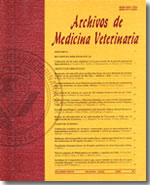Biochemical and clinical effects of oral hyaluronan in young Andalucian horses with tarsocrural osteochondrosis
Main Article Content
Abstract
The aim of this study was to evaluate the clinical and biochemical effects of an oral preparation of hyaluronic acid (HA) (Hyal-Joint®) in young Andalucian horses with osteochondrosis (OCD) of the tarsocrural joint. Our hypotheses were that the administration of oral HA is safe, diminishes the degree of synovial effusion and the synovial levels of nitric oxide (NO) and prostaglandin E2 (PGE2) and increases the plasmatic and synovial levels of HA. Eleven Andalucian young horses with OCD of the tarsocrural joint were included in a double blinded controlled study. Six horses received oral HA at 250 mg/day, during 60 days (T60) and 5 horses received a placebo. The initial values from the degree of synovial effusion, NO, PGE2 and HA synovial levels (affected joints) and HA plasmatic levels were obtained. A cytological analysis with determination of its total protein levels was performed. The horses were evaluated for same parameters at the end of the treatment (T60) and 30 days later (T90). Statistically significant differences for each one of the parameters evaluated in both groups were not observed through time (beginning, T60 and T90). Nevertheless, the horses treated with oral HA presented tendencies to show a minor degree of synovial effusion and higher synovial HA levels. Oral HA did not produce any adverse clinical effect in the horses treated during 60 days, and it is safe and well tolerated in horses at a dose of 250 mg/day.

